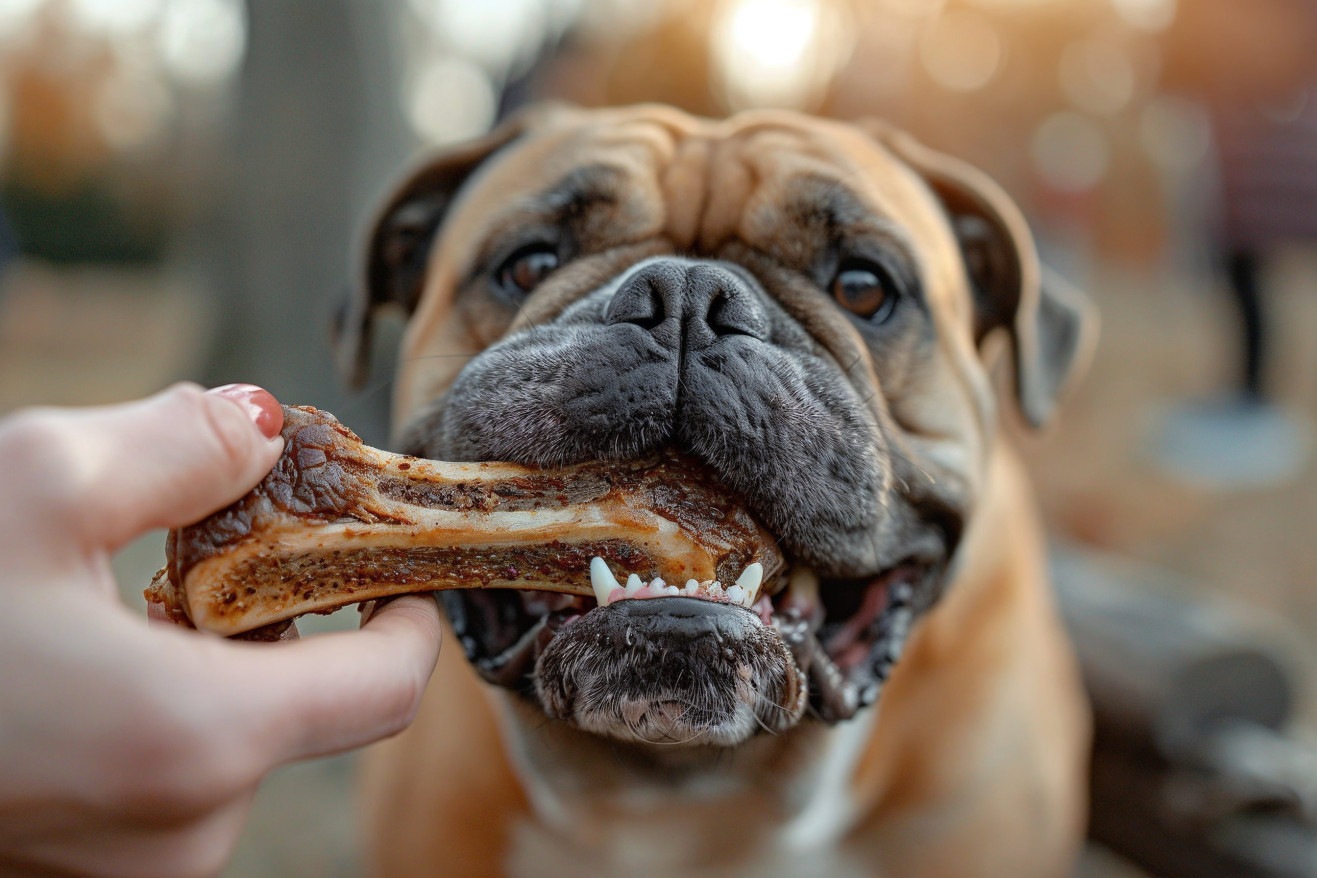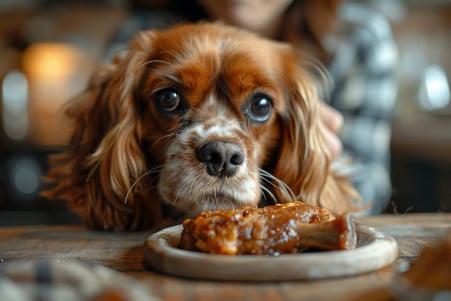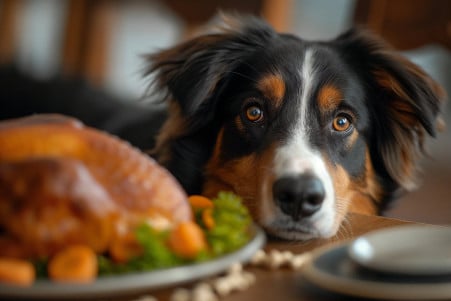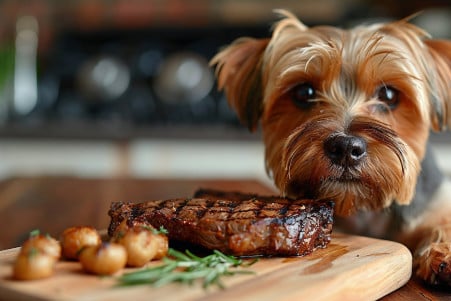Can Dogs Eat Steak Bones? The Dangers and Better Options
14 February 2024 • Updated 14 February 2024

While steak bones may seem like a delicious snack, are they actually safe for your furry friend? We don’t recommend giving your dog steak bones. Cooked steak bones can easily splinter, leading to choking or internal damage in dogs. Raw bones are less likely to splinter, but they can carry bacteria, which can make dogs sick. Instead, opt for safer options that will help keep your dog healthy.
Our evidence-based analysis covers a wide range of topics, including information from veterinary professionals, research on dog nutrition, and recommendations from animal advocacy groups. You’ll also learn about the canine digestive system, the dangers of giving dogs bones, and the nutritional factors that contribute to a healthy diet for dogs.
This in-depth overview will give you the information you need to make the best choices for your dog’s diet and chewing needs while keeping their health and safety in mind.
Can dogs eat steak bones?
How a Dog’s Digestive System Works and Why Bones Are Dangerous
A dog’s digestive system is designed to break down meat and some plant matter, but it’s not built to handle hard, indigestible items like bones. This is especially true of cooked steak bones. PetMD explains that cooked bones can splinter and cause lacerations in the intestines or blockages in the colon.
These splinters can cause a lot of damage as they work their way down the esophagus and into the stomach and intestines, which can result in life-threatening situations.
While a dog’s stomach acid can break down bones to some extent, large or jagged pieces can still cause blockages or damage as they move through the digestive system. The American Kennel Club explains that the splintering of bones can cause immediate harm, and the high fat content of bones can lead to long-term issues like constipation and pancreatitis.
Steak bones are especially dangerous because they are dense and tend to splinter into sharp pieces. While dogs may be attracted to the marrow and nutrients inside steak bones, the risks are not worth the potential rewards. It’s important to know about safer options that will satisfy a dog’s natural urge to chew without putting their health in danger.
Risks of Giving Dogs Steak Bones
While giving your dog a steak bone may seem like a fun and harmless treat, the risks associated with this practice are serious and varied. One of the most immediate risks is choking. Bone shards, especially those that have splintered, can easily get stuck in a dog’s throat and cause them to choke.
In addition, dogs that chew on hard, cooked bones are at high risk of breaking their teeth and other oral injuries, which can lead to expensive vet bills and pain for your pet.
The long-term risks are just as worrisome. Splintered bones can puncture a dog’s digestive system, leading to internal bleeding and potentially life-threatening infections. The American Kennel Club also notes that steak bones can lead to intestinal blockages in dogs, which often require surgery to fix.
In addition, raw steak bones come with their own set of risks. While they are less likely to splinter, they can be contaminated with bacteria, including Salmonella and E. coli, which can cause serious illness in both dogs and their human family members. Raw bones can also be infected with parasites like roundworms, which can lead to parasitic infections.
If your dog has eaten a steak bone, it’s important to act quickly. Remove any remaining bones, watch for signs of distress like gagging, vomiting, or lethargy, and call your vet right away. While steak bones can be a good source of nutrients for dogs, the risks associated with them mean that it’s important to find safer, healthier options to add to your dog’s diet.
How to Create a Balanced Diet for Your Dog: Nutrients and Healthy Bone Alternatives
A balanced diet is important for your dog’s well-being, and the essential nutrients they need are proteins, fats, carbohydrates, vitamins, minerals, and water, according to VCA Animal Hospitals.
While it has been long believed that bones are a good source of these nutrients, including calcium and phosphorus, the dangers of steak bones mean that they are not a necessary part of a dog’s diet. PetMD adds that it’s not just where these nutrients come from that’s important, but the quality and digestibility of them, which can be found in high-quality commercial foods that meet AAFCO guidelines.
Dog owners should make sure to buy dog food that is labeled with “complete and balanced nutrition,” according to WebMD, rather than relying on steak bones to provide the nutrients their dogs need.
This will ensure that all of the essential nutrients are included without the dangers that bones present. With the right food, dogs can get the nutrients they need for strong bones, a shiny coat, and overall health and wellness—without the risk of choking or internal damage from bone splinters.
As a result, dog owners can make sure their dogs get the nutrients and dental benefits they need without the risks that steak bones present by choosing well-formulated diets and vet-recommended chews.
Other Safe and Healthy Dog Chews to Consider
If you want to keep your dog chewing happily and healthily, there are many alternatives to steak bones that can help. The American Kennel Club explains that the key to finding the right chew for your dog is to take into account their size, age, and chewing style to make sure that the chew is safe and enjoyable.
For instance, you may want to go with a softer chew if you have a puppy or a senior dog with dental issues.
Many vets recommend chews that have been approved by the Veterinary Oral Health Council because they have been proven to be safe and effective at controlling plaque and tartar. Dr. Julie Buzby, DVM, says that chews from well-known brands like Kong and Zogoflex by West Paw are great choices because they are both durable and good for your dog’s teeth.
The Kind Pet suggests options like carrots and Better Bone Tough chew toys for maintaining good oral health without the risk of splintering. These options not only help keep teeth clean, but they also keep dogs mentally stimulated, which can help prevent boredom and anxiety.
Make sure to supervise your dog while they’re chewing to make sure they’re safe, especially when you’re introducing new chews or toys. By sticking with products that have been recommended and tested by vets, you can make sure that your dog has a safe and healthy chewing experience that will benefit their overall health.
How to Keep Your Dog’s Teeth Healthy
Dental health is important for dogs, not only for their teeth and gums but also for their overall health. While many people think that chewing on bones can help with dental health, this is a myth. In reality, bones can lead to a number of dental issues, including broken teeth and oral trauma.
Instead, focus on keeping your dog’s teeth healthy with safe and effective methods, which are backed by good nutrition and dental diets.
One of the most important ways to promote dental health without the risks associated with chewing on bones is to use Veterinary Oral Health Council (VOHC) approved diets and products. According to VCA Animal Hospitals, a dental diet that has been approved by the VOHC can help reduce plaque and control periodontal disease.
Look for products that have the VOHC seal, which ensures that they have been proven to be effective in plaque control. These products are also larger and are designed to help clean the teeth mechanically as they are chewed.
By making sure that you are using these dental diets and products, you can help ensure that your dog has good dental health for years to come and avoid the potential problems that come with chewing on bones. With the right care and knowledge, you can make sure that your pet has a healthy mouth and a happy life.
Final Thoughts: Keeping Our Dogs Safe and Healthy
The dangers of feeding steak bones to dogs are numerous and well-documented. From the risk of splintering and choking to the potential for gastrointestinal injury and bacterial contamination, there is a strong case against continuing to feed dogs this traditional treat. The truth is that the canine digestive system is not designed to safely handle steak bones.
Thankfully, there are many safe and healthy alternatives, from vet-approved chew toys to dental diets that are specially formulated to support oral health. Not only do these alternatives eliminate the risks of bone chewing, but they also support the overall health and dental hygiene of our pets.
It’s important for pet owners to make choices that are based on the best available information and that prioritize the health and safety of their pets.
By choosing the right diet and chew options, we can ensure that our dogs are healthy, happy, and loyal members of our families for years to come.
And in the process, we can ensure that we are making choices that are in the best interest of their well-being. After all, making informed choices about pet care is one way that we can show our love and commitment to the animals that bring so much joy to our lives every day.


